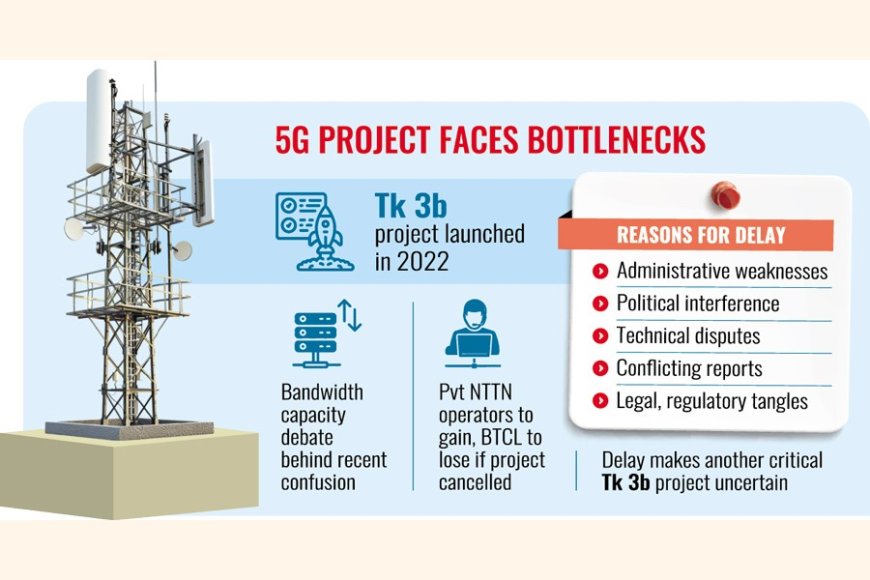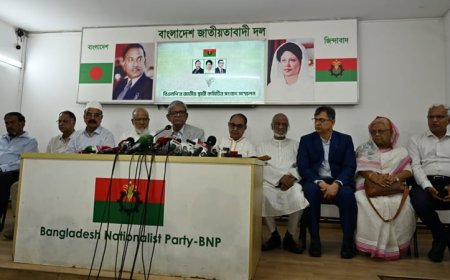BTCL's 5G rollout hits roadblock amid controversy
BTCL's 5G rollout hits roadblock amid controversy

BTCL's 5G Project Stalled Amid Bureaucratic Deadlock and Controversy
Three years after its launch, the Bangladesh Telecommunications Company Limited’s (BTCL) much-anticipated 5G Readiness Project remains in limbo—bogged down by controversy, bureaucratic inertia, and allegations of irregularities.
The prolonged delay jeopardises not only the Tk 3 billion 5G project but also a parallel Tk 3 billion regulatory capacity-building initiative, potentially resulting in a cumulative government loss exceeding Tk 6 billion.
Initiated in 2022, the project aimed to lay the foundation for a modern telecommunications infrastructure capable of meeting Bangladesh’s rising bandwidth demand through 2030. However, its progress has been hampered by administrative inefficiencies, political interference, technical disagreements, and legal complications.
Controversy escalated following a semi-official letter from Faiz Ahmad Taiyeb, special assistant to the chief adviser, which drew media attention and triggered an Anti-Corruption Commission (ACC) inquiry—despite the letter lacking any formal directive.
Although technical specifications for the tendered equipment were approved in September 2020, vested interests have since attempted to undermine the evaluation process for personal gain.
After April 2023, then-BTCL Managing Director Asaduzzaman Chowdhury delayed accepting the technical evaluation report, flouting procurement rules that require tender winners to be notified within seven days. His failure to act was later cited as grounds for his removal.
Amid the impasse, a rival bidder bypassed protocol by writing directly to the telecom minister on April 24, 2023, questioning the equipment’s eligibility and calling for fresh tenders. This went against proper procedure, which requires such concerns to be submitted to the project director. Notably, no objections were raised during a stakeholder meeting on October 30, 2022, or by the official deadline of November 3.
In May 2023, a little-known entity calling itself the Bangladesh Internet Consumers Association submitted a letter to the Planning Ministry claiming the technology was outdated. However, the group had no verifiable contact and was untraceable at its listed address. The letter also contained details seemingly accessible only to tender participants—raising suspicions of insider involvement.
A seven-member committee appointed by the Posts and Telecommunications Division later validated the technology as compliant with International Telecommunication Union (ITU) standards, already in use in countries like Singapore since 2021.
A former BUET vice-chancellor and BTCL board member supported the evaluation, stating the chosen technology was best suited to Bangladesh’s geographic and socio-economic conditions, dismissing claims of obsolescence.
A key point of contention is the required bandwidth capacity—whether it should be 26 terabytes or 126 terabytes. Initial feasibility studies underestimated domestic cache demand by focusing solely on international bandwidth. Experts now argue that the higher 126-terabyte provision is necessary to accommodate emerging needs, including virtual reality, high-definition video, and high-speed 5G internet.
Faiz Ahmad Taiyeb has projected that Bangladesh’s current internet footprint of 35–36 terabytes could increase to 175 terabytes within 12 years, following an annual growth rate of 34–45% as seen in other developing nations.
Analysts believe halting the project would ultimately benefit private National Telecommunication Transmission Network (NTTN) operators while financially harming BTCL, which had planned to lease its fibre-optic infrastructure to public and private clients.
After the fall of the Awami League government, the new telecom adviser Nahid Islam commissioned a fact-finding report, which concluded that the Public Procurement Act (PPA) 2006 and Rules (PPR) 2008 had been followed properly. However, two board members—Tamjidul and Mahmud Hossain—rejected the findings and demanded a fresh report.
Despite attempts by the Central Procurement Technical Unit (CPTU) to revive the process, a court petition by an unrelated party put the project on hold. Although the court has since cleared the way for resumption, the ACC has added the project to its watch list.
Meanwhile, a Tk 3 billion letter of credit (LC) was cancelled, and the associated capacity-building initiative now faces uncertainty. Since the 5G infrastructure shares specifications with BTCL’s parallel IP network upgrade, any delay in the former hinders commissioning of the latter—risking both financial losses and unused equipment.
On June 18, ACC Secretary Khorsheda Yasmin wrote to the Posts and Telecommunications Ministry citing initial irregularities in line with the PPA and PPR, though no supporting evidence was provided. She recommended suspending all project activities.
In response, Faiz Ahmad Taiyeb urged the ACC in another semi-official letter to clear the LCs to avoid further financial damage. He suggested invoking GCC Clause 38.4, allowing a factory acceptance test to be conducted later by qualified experts.
At a press conference, Taiyeb clarified that his letter was not intended to interfere with the ACC investigation. ACC Deputy Director Akhtarul Islam supported this interpretation, stating, “I have seen the letter from Mr Taiyeb. In my view, there is nothing in it that could influence the ACC’s investigation. I do not believe the ACC has any reason to regard it as offensive or obstructive.”
What's Your Reaction?





















































































